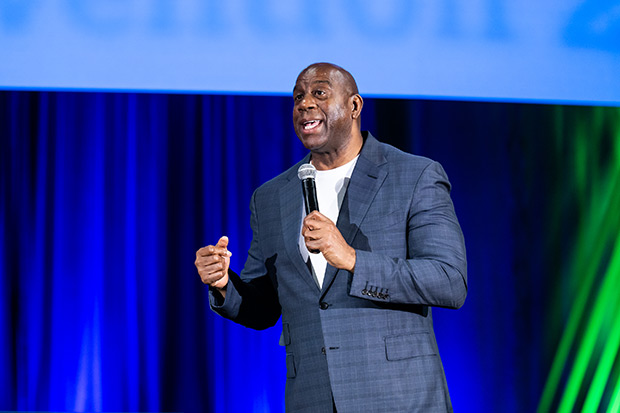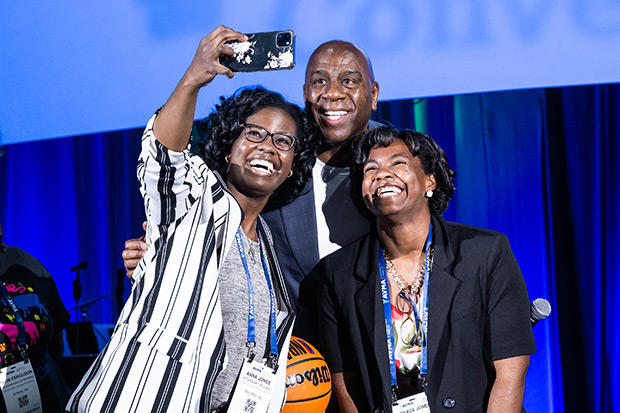Johnson emphasizes hard work as the foundation for his success, on and off the court

Johnson emphasizes hard work as the foundation for his success, on and off the court
By AVMA News
Earvin “Magic” Johnson, legendary for his dynamic playmaking on the basketball court, didn’t mince words when asked how he deals with rejection. He said it’s a part of life and will come in many ways, whether that’s getting fired from a job or going through a breakup. The important part is loving and believing in yourself, he said, and then picking yourself up and not giving up.
“Don’t let somebody change who you are and don’t let somebody define who you can become. If I was still listening to people, there’s no way I’d be in the NBA or in a board room,” he said.
Johnson gave plenty more advice during the keynote presentation, “Making the Magic Happen,” at AVMA Convention 2024 on Saturday in Austin, Texas as he shared stories about his journey as one of 10 kids in a family from Lansing, Michigan, to becoming a billionaire. The talk was sponsored by Hill’s Pet Nutrition.

Johnson’s journey started on the basketball court. He won every tournament he was in from third to ninth grade, “because that’s what I’m about: winning.” He earned the nickname “Magic” at age 15, when a sportswriter witnessed him score a triple-double in a blowout game against a major opponent.
In high school, he was bussed to an all-white school after having previously only attended schools with all Black students. The principal asked him and the school’s quarterback, who was white, to help deal with the racial tension that occurred the first few weeks because he knew the students would listen to both of them. “At that moment, life changed forever,” Johnson said, as he became a leader both on and off the court.
He led his high school basketball team to a state championship in 1977 and led Michigan State University to the NCAA championship in 1979. Johnson couldn’t help but to include some playful jabs against his long-time rival, Larry Bird. Michigan State beat Bird’s Indiana State University, who had not lost a single game that season, in the final college championship game. “I had to take the Birdman down that night,” Johnson said.
Johnson left Michigan State after his sophomore season and was selected by the Los Angeles Lakers with the first overall pick in the 1979 NBA draft. Johnson later guided the Lakers to NBA championships in 1982, 1985, 1987, and 1988. Bird won championships with the Boston Celtics in 1981, 1984, and 1986.
“We put the madness in March and turned the NBA around and we did it together. Two guys who could do it all. And two guys who cared more about passing the basketball than scoring the basketball. That was the beauty of it,” he said.
After his career in basketball, Johnson wanted to use the money he had saved to create more job opportunities in Black and Hispanic communities.
It started with Magic Johnson Theaters, which he made sure were built in minority-predominant communities, and which AMC Theaters later bought out. He also convinced Howard Schultz, CEO of Starbucks, to partner so they could build 125 stores in 40 markets in similar communities. And while he eventually sold his stake in and his part ownership of the Lakers, Johnson invested in other ventures with his firm Magic Johnson Enterprises, most recently the NFL’s Washington Commanders. “This is not just for me,” he recalled saying in an interview at that time. “This is for a lot of minorities, African Americans,” to break down barriers and be part of NFL team ownership.
Later in his talk, he invited audience members to ask him questions. One attendee asked what advice he had for young people wanting to get into the veterinary profession. Johnson said it was all about learning and meeting people.

“When I went to conferences, I had 10-20 business cards in my pocket,” he said. “Networking is one of the most important things you can do at this conference. Make sure you take advantage of expertise of those who have been in the industry. If they can mentor you or you can call and ask questions. Shake hands with people, ask questions, stop by booths. The only reason I’m standing here is because that’s what I did.”
Johnson was also asked what advice he had for people who feel burnout at work.
He answered that it’s all about perspective. Coming from a low-income family, he was instilled with a strong work ethic and an appreciation for what he has.
“Every time I get a job, I get excited, because I could be without one. Right? So, when you go there now (into work), we got to go in with passion and fire,” he said. Johnson added that it’s important to recuperate, saying that on the weekends he likes to relax to recharge. On Sundays, after church, “I’m getting the remote in my hand,” so he can decompress and be ready for Monday.
To accomplish your goals and dreams, he advised, putting in the work now can put you in a position someday where you don’t have to work as hard.
“You met the right person today. You were supposed to meet me today,” he said. “Put up on your whiteboard: ‘Magic told me that one day it’s not going to be like this.’”
One final piece of advice: understand to the power of investing.
Johnson learned that lesson the hard way when he was in his 20s. Shoe companies were pursuing him to sign a deal with them, including Converse and Adidas. Another company, which was just up-and-coming at the time, was Nike. It couldn’t offer him as much money upfront as the other companies but could give him stock options.
“I turned it down,” Johnson said. “They just ran an analysis on if I had taken the stock in 1979. You know how much money I’d have today? $1.4 billion.
“Know money and understand it. I did OK after that, though,” he said as the audience laughed “My life is OK.”
